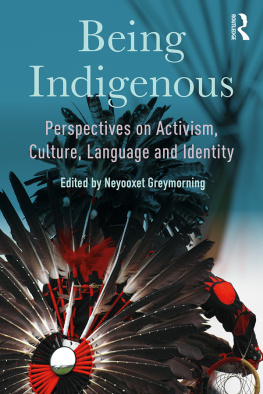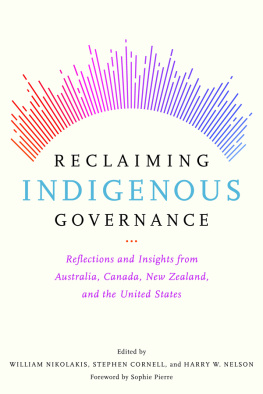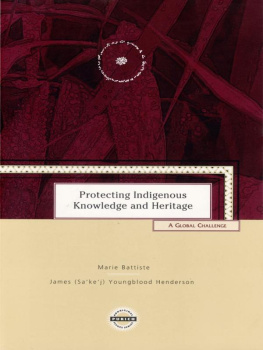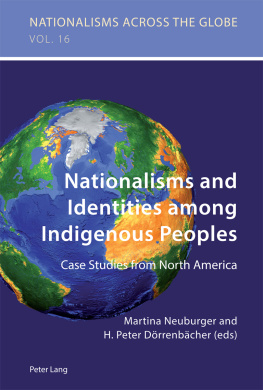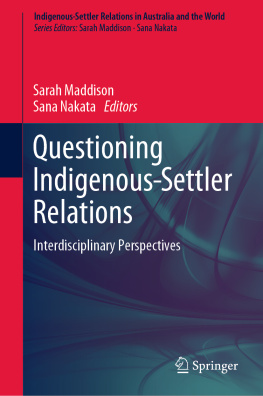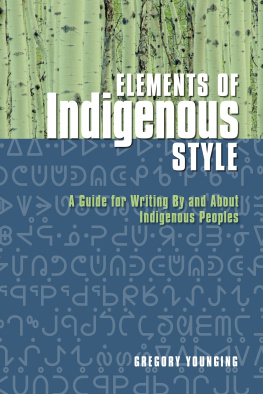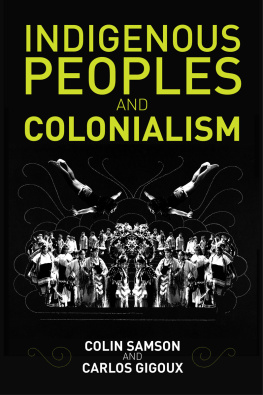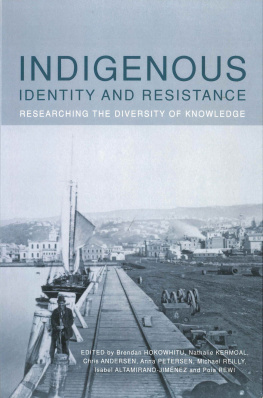
BEING INDIGENOUS
This volume gives voice to an impressive range of Indigenous authors who share their knowledge and perspectives on issues that pertain to activism, culture, language and identity the fabric of being Indigenous. The contributions highlight the experiences of Indigenous peoples from a variety of countries, including the United States, Canada, Australia, New Zealand, Japan, Greenland, Norway and Russia. The book provides valuable historical and political insight into the lingering impact of colonization, considering the issues faced by Indigenous peoples today and reflecting on the ability of their cultures, languages and identities to survive in the twenty-first century.
Neyooxet Greymorning is a Professor in the Departments of Native American Studies and Anthropology at the University of Montana, USA.
p.iii
BEING INDIGENOUS
Perspectives on Activism, Culture,
Language and Identity
Edited by Neyooxet Greymorning

p.iv
First published 2019
by Routledge
2 Park Square, Milton Park, Abingdon, Oxon OX14 4RN
and by Routledge
711 Third Avenue, New York, NY 10017
Routledge is an imprint of the Taylor & Francis Group, an informa business
2019 selection and editorial matter, Neyooxet Greymorning; individual chapters, the contributors
The right of Neyooxet Greymorning to be identified as the author of the editorial material, and of the authors for their individual chapters, has been asserted in accordance with sections 77 and 78 of the Copyright, Designs and Patents Act 1988.
All rights reserved. No part of this book may be reprinted or reproduced or utilised in any form or by any electronic, mechanical, or other means, now known or hereafter invented, including photocopying and recording, or in any information storage or retrieval system, without permission in writing from the publishers.
Trademark notice : Product or corporate names may be trademarks or registered trademarks, and are used only for identification and explanation without intent to infringe.
British Library Cataloguing-in-Publication Data
A catalogue record for this book is available from the British Library
Library of Congress Cataloging-in-Publication Data
A catalog record has been requested for this book
ISBN: 978-1-138-31491-7 (hbk)
ISBN: 978-1-138-31490-0 (pbk)
ISBN: 978-0-429-45477-6 (ebk)
Typeset in Bembo
by Swales & Willis Ltd, Exeter, Devon, UK
As we moved down that hall to the room where the collection was displayed my heart was in my throat. I cried as I saw the collection behind twelve-foot walls of Plexiglas. The sacred bundles were placed the highest out of reach. I was embarrassed to watch the Elders beg the curator to touch the bundles, to take care of them they said. Finally he relented and the bundles came down. I cried with the old women as they talked to the spirits and called them friend. The next 20 minutes was a blur. A young member of our tribe made the personal decision to capture the pipe Blackfeet style.
Bonnie Heavy Runner, from A Will to Survive
This book is dedicated to the resilience of Indigenous Peoples in their struggles as Protectors of their Waters, Lands and Cultures.
Arleen Adams is Salish and Kootenai of the Confederated Salish and Kootenai Tribes, of Montana. She holds a bachelors degree in Native American Studies from the University of Montana, USA, with a minor in Anthropology. Arleen has served in various capacities as a teacher, an educator, a faculty member, a board member and in administrative assistant positions throughout Salish Kootenai College, Two Eagle River Tribal School and the Confederated Salish Kootenai Tribes (CS&KT). She is a certified Class Seven Native Bilingual Instructor. Arleen has an extensive history of working for the preservation of Salish and Kootenai languages and culture.
Anna Afanasyeva is Kildin Smi of the Kola Peninsula, in Northwest Russia. Since 2006 she has been involved in various project-related activities, such as the project Skolt Smi culture across borders and Indigenous Entrepreneurship project, as well as community-based research that has documented endangered Smi languages within her own Kola Peninsula community. In 2013, Anna defended her Masters of Philosophy in Indigenous Studies on the topic of Forced relocations of the Kola Smi people: Background and consequences, at the Arctic University of Norway (UIT). In her Masters project she discussed the implementation of Soviet forced relocation policies from 1930s to the 1970s. Currently, Anna works as a PhD fellow funded by the Research Council of Norway at UIT, on a project devoted to the analysis of assimilation policies in education of the Kola Smi in Russia from 1910 to 2010.
Larissa Behrendt is a Professor of Law and Indigenous Research and the Director of the Jumbunna Indigenous House of Learning at the University of Technology, Sydney, Australia. She graduated from the University of New South Wales Law School in 1992. She graduated with a Doctorate of Juridical Science from Harvard Law School in 1998. Larissa was admitted to the Australian Capital Territory Supreme Court as a barrister-of-law, has worked as a practicing lawyer in the areas of Aboriginal land claims and family law, and has taught at the University of New South Wales and the Australian National University Law Schools. She has also spent time working in Canada and at the United Nations with First Nations organizations. Larissa has published on property law, Indigenous rights, dispute resolution and Aboriginal womens issues.
Jeff Gayman is an expatriate American of Irish, German and English descent who has resided in Japan for 25 years. He is currently employed at the Graduate School of Education and Research Faculty of Media and Communication, Hokkaido University, Japan. His areas of specialty are Indigenous education and educational anthropology.
Neyooxet Greymorning is a Full Professor in the Departments of Anthropology and Native American Studies at the University of Montana. He completed his doctoral degree (1992) in political anthropology at Oklahoma University, USA. His dissertation topic, Indigenous Peoples and the Ethnocentrism of the Courts, was nominated for the 1995 North American Indian Prose Award. He has written numerous articles on language and sovereignty issues, including: The Imperialism of Cultural Appropriation (1997); Running the Gauntlet of an Indigenous Language Program (1999); The Colonization of Indigenous North America (1999); Reflections on the Arapaho Language Project or, When Bambi Spoke Arapaho and Other Tales of Arapaho Language Revitalization Efforts (2002); Fletcher v. Peck (2007); Preserving Indigenous Languages (2011); Eighteen Years of Running a Language Gauntlet (2011); Educating Indians: A Colonizing Agent of the United States of America (2012); Understanding Culture and Language Ethnocide (2014); Beyond IH: Indigenous Knowledge and Traditional Approaches to Health and Healing (2015); and The Anglocentric Supremacy of the Marshall Court (2017). Neyooxet founded and has served as the Executive Director of Hinonoeitiinoowu (Arapaho Language Lodge) since its inception in 1995.
Gunvor Guttorm was born in a small village in Sapmi, Northern Norway, which is part of Smi land. Her first language is Smi and she currently lives in Jokkmokk, Sweden, which is also part of Smi land. Gunvor works at Smi University of Applied Sciences in Guovdageaidnu, Norway, as a Professor of Smi Arts.
Robert Hall was born and raised Blackfeet, and grew up playing and watching his uncles and father referee sports. He eventually followed after them by becoming a referee. Roberts mother, who was a caretaker and councilor of many Blackfeet youth, was also a source of inspiration. Robert has dedicated his life to Blackfeet youth and culture and, although not raised with the language, is one of the youngest speakers of the Blackfoot language. Robert attended the University of Montana where he received a BA in Anthropology, with an emphasis on linguistics, and a BA in Native American Studies. He was also the first to receive the Universitys certificate for language maintenance and rejuvenation. Robert is currently working on his Masters degree on language revitalization and pedagogy. Robert has worked at four institutions teaching the Blackfoot language. He taught one semester at the University of Montana and two years at the Cuts Wood Academy Blackfeet immersion school in Browning, MT. He taught full time at the Blackfeet Community College (BCC) during 201516 and now runs the Native Studies program for Browning public school district #9 while maintaining an adjunct position at BCC.
Next page
